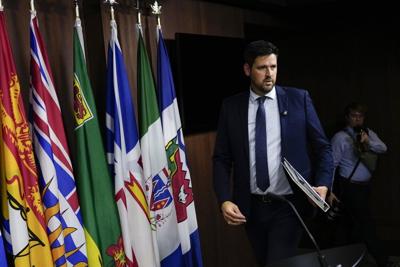OTTAWA—Under pressure in the face of a rise in crimes targeting Jewish and Muslim Canadians, and fulfilling a campaign promise to get tough on crime, the Carney government tabled new legislation Friday to combat hate.Â
But while Justice Minister Sean Fraser had expressed hope the proposed law would have broad appeal, Bill C-9 was met with mixed reaction, with some praising the changes while lawyers, pro-Palestinian groups and Canada’s biggest Muslim advocacy organization said it could be difficult to enforce while overreaching on limiting Canadians’ right to protest and failing to address the root causes of rising hate.
“One of the great promises of Canada is the ability of our citizens to live freely in their communities, regardless of the colour of their skin, the God they pray to or the person that they love,” Fraser told a news conference in Ottawa.
“Sadly, too many Canadians are robbed of these freedoms that so many of us take for granted. Frankly, the prevalence of hate crimes in this country that steal those freedoms is something that should shock the conscience of every Canadian. ”
Prime Minister Mark Carney’s proposed fix is a slew of Criminal Code revisions that would criminalize intimidating or obstructing people from accessing places of worship, schools, community centres and other places primarily used by identifiable groups, a promise made in the Liberal party’s election platform.
The bill goes further by defining hate in the Criminal Code and making hate-motivated crime a specific offence. It also makes it a crime to display symbols of government-designated terror groups, as well as Nazi imagery, for the purpose of willfully promoting hatred. It also allows police to lay hate-crimes charges without the attorney general’s consent.
As he tabled the legislation, Fraser said the government has a duty to stop hate from festering. News of synagogue firebombings, assaults on hijab-wearing women, and hateful vandalism have dominated headlines in recent years, and police-reported hate crimes have risen for six consecutive years. In 2024, they were more than double what they had been in 2018.Â
Against that backdrop, the legislation was immediately praised by major Jewish groups.
“Now Parliament must finish the job and pass this legislation without delay. Fighting hate must not be a partisan issue,” B’nai Brith Canada said.
The National Council of Canadian Muslims, however, did not express the same enthusiasm. Spokesperson Steven Zhou said he was glad to see an attempt by the government to tackle the problem, including by defining hate and streamlining the process to charge for hate crimes, but felt the measures regarding terror symbols and places of worship went too far in restricting freedom of expression.
“We feel like this is very last minute; it was done without consultation, and it reminds us of the Harper-era provisions that had to do with ‘glorification of terror’ that I think our community reacted very negatively towards, and ultimately, we feel like it’s just an extra layer that is unneeded, that hurts free expression, free speech, and doesn’t really carry any security benefits for the wider public,” Zhou said. “We need protections around that, but I don’t think we’ve quite struck that correct balance as a nation just yet.”
His group, and others saw the proposed legislation in the context of tensions and protests over Israel’s war in Gaza, and expressed concern that its terms are too vague and might restrict people’s ability to protest, despite the government’s insistence that isn’t the case.
Likewise, AnaĂŻs Bussières McNicoll, the director of the Fundamental Freedoms Program at the Canadian Civil Liberties Association, warned the bill’s provisions might stigmatize protest and deter people from expressing dissent.
Adding to those fears was Fraser’s inability Friday to cite examples of when displaying terror symbols would be a criminal activity — the legislation only says journalism, religion, education or art are excluded — and at what point a protest might cross the line into “intimidation or obstruction.”
He said the laying of charges will only follow an “extremely fact-dependent analysis that will depend heavily on the very specifics that happen in a given instance.”
“It’s difficult for me to engage on a hypothetical basis, because the facts of a given scenario may be very different,” Fraser said.
“It’s not lost on me that we are in new territory, and sometimes there may be a learning curve with the adoption of these new laws, so we’re going to work alongside our provincial counterparts and with law enforcement to ensure that they have the tools that they need.”
Rob Dhanu, a lawyer and former B.C. prosecutor, said there are already laws against mischief and intimidation, and proving “willful promotion of hatred” when someone is displaying a terror symbol may require hate speech that would already be illegal under Canadian law. He also said allowing police to bypass a provincial attorney general might wrongly lower the bar for charges against speech, even if it removes bottlenecks when combating hate crimes.
“It’s a bit of a Band-Aid solution to what I would describe as probably serious societal hemorrhaging,” Dhanu said.
Error! Sorry, there was an error processing your request.
There was a problem with the recaptcha. Please try again.
You may unsubscribe at any time. By signing up, you agree to our and . This site is protected by reCAPTCHA and the Google and apply.
Want more of the latest from us? Sign up for more at our newsletter page.



























To join the conversation set a first and last name in your user profile.
Sign in or register for free to join the Conversation